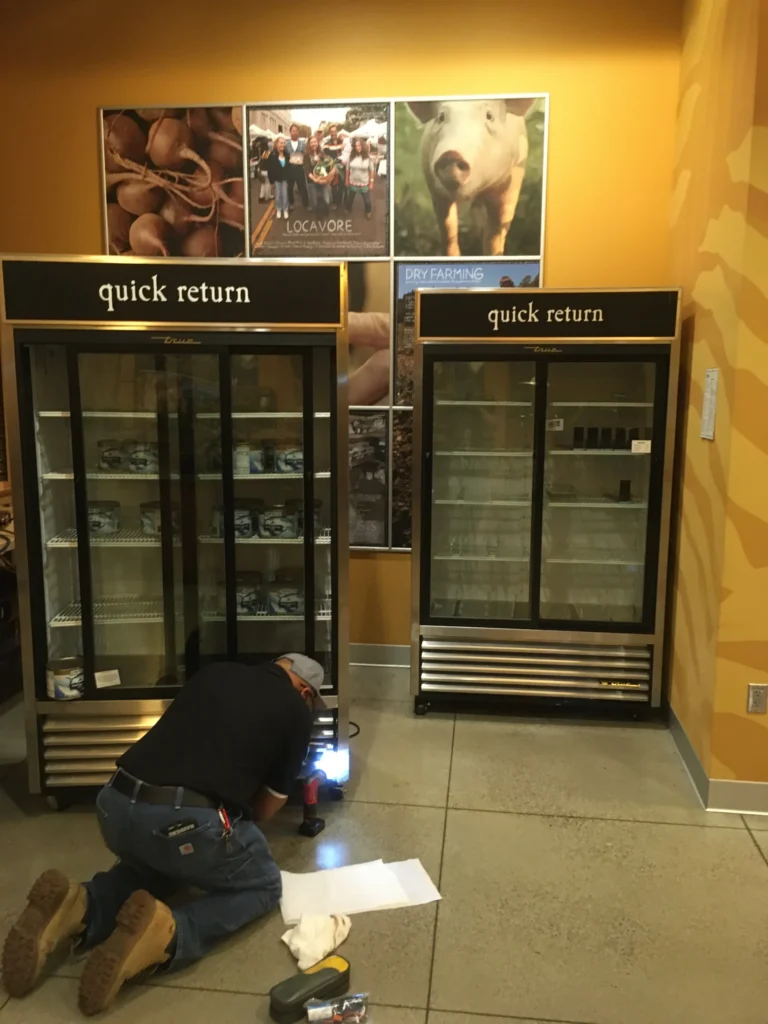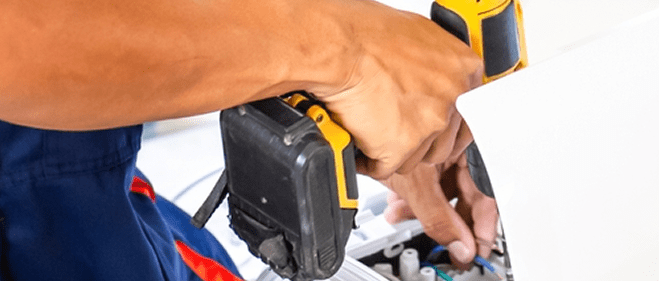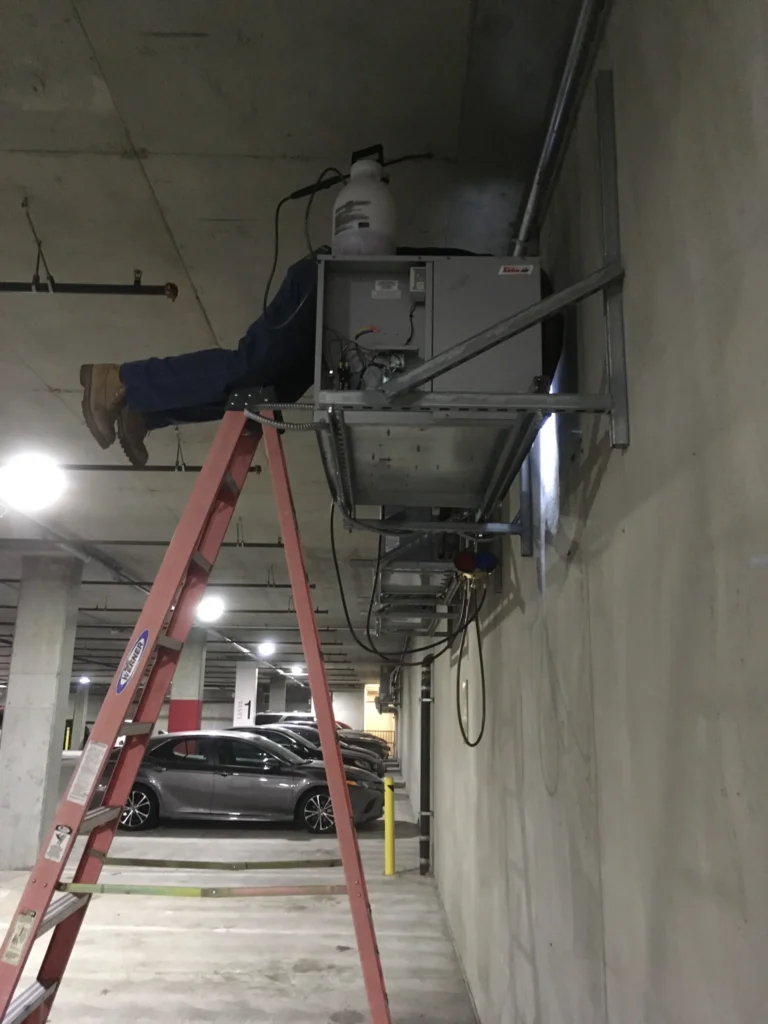24/7 Emergency Commercial Refrigeration Services
Table of Contents
24/7 Emergency Commercial Refrigeration Services
When your commercial refrigeration system fails, every minute counts. A broken walk-in cooler can destroy thousands of dollars in inventory within hours. A malfunctioning freezer shuts down your entire food service operation. A failing ice machine leaves customers frustrated and revenue walking out the door.
Refrigeration emergencies don’t wait for convenient business hours. They strike during the hottest days when systems face maximum stress, often occurring during peak service periods when your business can least afford downtime. The difference between minor inconvenience and catastrophic loss comes down to how quickly professional help arrives.
This guide reveals why rapid emergency response is critical for your business, which industries depend most on reliable refrigeration, and how to choose emergency services that restore your cooling systems while protecting your bottom line.

Rapid Response When Refrigeration Fails
Commercial refrigeration systems operate under demanding conditions that create unique failure patterns. Unlike residential units that cycle based on occupancy, commercial systems run continuously to maintain precise temperatures for food safety and product preservation.
When these critical systems fail, the consequences multiply exponentially. Rising temperatures threaten inventory while forcing immediate decisions about food safety, customer service, and business continuity that can cost thousands within the first few hours.
Avoid Product Loss, Downtime & Business Disruption
Immediate inventory protection becomes the top priority when refrigeration systems fail. Temperature-sensitive products begin deteriorating within minutes of cooling loss, creating a race against time to restore proper storage conditions.
Food service operations face the highest stakes during refrigeration failures. A typical restaurant carries $5,000-15,000 in perishable inventory that spoils rapidly without proper refrigeration. Walk-in cooler failures can destroy an entire day’s food preparation while forcing menu modifications that disappoint customers.
Grocery stores and supermarkets face even larger potential losses. A single freezer section failure can destroy $50,000-100,000 in frozen products within 4-6 hours. Ice cream, frozen foods, and specialty items become total losses when temperatures rise above safe storage levels.
Temperature documentation becomes critical for insurance claims and food safety compliance. Professional emergency services provide temperature monitoring during repairs to document conditions and support damage claims. This documentation protects businesses from regulatory violations while enabling insurance recovery.
Business continuity preservation requires immediate action to maintain customer service despite equipment failures. Emergency refrigeration services understand that delayed response cascades into lost revenue, disappointed customers, and damaged reputation.
Restaurant operations adapt quickly to refrigeration failures through menu modifications, supplier relationships, and temporary storage solutions. Professional emergency services coordinate these adaptations while working to restore normal operations as quickly as possible.
Retail operations require different strategies including customer communication, product transfer, and sale prioritization for items at risk. Emergency services work with management teams to minimize customer impact while preventing total inventory losses.
Revenue protection extends beyond immediate inventory losses to include customer satisfaction, operational efficiency, and competitive positioning. Refrigeration failures that force menu restrictions or store closures create losses that exceed equipment repair costs.
Customer loyalty suffers when refrigeration problems affect product quality or availability. Professional emergency response minimizes these impacts while demonstrating commitment to quality that builds long-term customer confidence.
Operational efficiency drops significantly when staff must work around failed refrigeration equipment. Emergency response restores normal workflows while preventing the productivity losses that extended outages create.
Emergency Repairs for Coolers, Freezers, and Condensers
Different refrigeration systems create unique emergency challenges that require specialized diagnostic skills and immediate response capabilities. Professional emergency technicians understand these systems while carrying equipment needed for rapid repairs.
Commercial refrigeration emergencies often involve multiple interconnected components that create cascading failures. Professional diagnosis identifies root causes while addressing immediate cooling needs through temporary solutions when necessary.
On-the-Spot Diagnostics & Temporary Cooling Solutions
Advanced diagnostic capabilities enable rapid problem identification that minimizes repair time while ensuring accurate solutions. Professional diagnostic equipment reveals problems that basic tools cannot detect, preventing misdiagnosis during high-stress emergency situations.
Electronic system analyzers identify electrical problems, control system faults, and sensor malfunctions that affect modern commercial refrigeration systems. These sophisticated tools provide precise diagnosis that reduces troubleshooting time significantly during emergencies.
Refrigeration system testing equipment measures pressures, temperatures, and refrigerant flow patterns that indicate system health. Professional testing prevents guesswork while ensuring emergency repairs address actual problems rather than symptoms.
Comprehensive parts inventory enables immediate repairs without delays for parts ordering. Emergency service vehicles carry common replacement components including compressors, thermostats, sensors, contactors, and door hardware that address most refrigeration failures.
Compressor replacement capabilities handle the most serious refrigeration failures that threaten complete system loss. Professional emergency services carry backup compressors for common commercial systems, enabling same-day restoration of cooling capacity.
Control system components including thermostats, sensors, and circuit boards are stocked for immediate replacement. These electronic components often fail without warning, making immediate availability critical for rapid emergency response.
Temporary cooling solutions maintain food safety and business operations while permanent repairs are completed. Professional emergency services deploy portable refrigeration units, emergency generators, and temporary modifications that bridge repair periods.
Portable refrigeration units provide immediate cooling for critical inventory during major system repairs. These emergency units range from small reach-in coolers to large trailer-mounted systems that handle walk-in cooler capacities.
Emergency procedures prioritize the most critical cooling needs first. High-value inventory, temperature-sensitive products, and food safety requirements receive immediate attention while less critical items may accept temporary temperature variations.
Load management during emergencies prevents electrical system overload while maintaining essential cooling. Professional technicians understand power limitations while configuring emergency equipment for optimal performance without causing additional problems.
Serving All Industries That Rely on Cold Storage
The Bay Area’s diverse economy creates unique refrigeration challenges across multiple industries that depend on reliable cold storage. Each industry faces specific risks and requirements that emergency refrigeration services must understand and address effectively.
Professional emergency services adapt response strategies to industry-specific needs while maintaining the technical expertise that complex commercial systems require. This specialization ensures optimal emergency response regardless of business type.
Restaurants, Warehouses, Grocery Stores, and More
Restaurant and food service operations face immediate business disruption when refrigeration systems fail. Kitchen workflows depend on reliable cold storage for food preparation, inventory management, and health code compliance.
Fine dining establishments carry expensive specialty ingredients that represent significant financial exposure during refrigeration failures. Truffle oils, aged proteins, and imported ingredients can represent thousands of dollars per incident when proper storage temperatures are lost.
High-volume restaurants depend on walk-in coolers for prep work storage, daily inventory, and weekend preparation. Failures during peak service periods create immediate operational challenges that professional emergency response must address rapidly.
Catering operations face unique challenges because refrigeration failures affect multiple events and customer commitments. Emergency services coordinate responses that minimize customer impact while protecting business relationships.
Grocery and retail food operations manage diverse product categories with different storage requirements and risk profiles. Emergency services must understand these varied needs while providing comprehensive solutions.
Produce sections require specific temperature and humidity control that maintains appearance and extends shelf life. Emergency repairs address both cooling and humidity systems that preserve product quality.
Meat and seafood departments face strict food safety requirements that make temperature excursions particularly serious. Professional emergency response includes temperature documentation and food safety consultation.
Frozen food sections represent the highest value density and shortest failure tolerance times. Emergency services prioritize these areas while providing rapid response that prevents total inventory losses.
Warehouse and distribution operations handle large-scale cold storage that serves multiple customers and locations. These operations require emergency services that understand complex refrigeration systems and logistics coordination.
Cold storage warehouses maintain inventory for multiple food service operations, making failures affect numerous businesses simultaneously. Emergency coordination includes customer notification and priority systems that minimize widespread impacts.
Distribution centers require rapid response because delays affect delivery schedules and customer commitments throughout the supply chain. Professional emergency services understand these time pressures while providing effective solutions.
Healthcare and pharmaceutical storage requires precise temperature control for medications, vaccines, and biological samples. These applications demand immediate response because product losses often cannot be replaced.
Vaccine storage follows strict temperature requirements with limited tolerance for excursions. Professional emergency services understand these requirements while providing documentation needed for regulatory compliance.
Research facilities store valuable samples and compounds that represent years of work and significant investment. Emergency response protects these irreplaceable materials while ensuring continued research operations.

Emergency HVAC Issues We Fix
Your system may need urgent attention if you’re experiencing:
- No airflow from vents
- Furnace blowing cold air
- AC blowing warm air
- System won’t turn on
- Iced-over AC or refrigerant line
- Thermostat not responding
- Loud, unusual noises from the unit
- Weak airflow or poor indoor air quality
- Water leaks around the unit
- Burning smells or electrical odor
- Complete system failure
If you notice any of these signs, don’t wait. Contact COOL AID for immediate HVAC help.
Why Choose 1800CoolAid for Emergency Refrigeration?
Emergency refrigeration service quality directly impacts repair effectiveness, business recovery time, and total incident costs. The difference between adequate and exceptional emergency service often determines whether minor problems become major disasters.
Professional emergency services combine technical expertise with crisis management skills that standard service calls don’t require. This specialization ensures rapid response while maintaining quality standards during high-pressure situations.
Available 24/7 – Fully Licensed and Experienced Technicians
Round-the-clock availability ensures professional help is accessible when refrigeration emergencies strike regardless of timing. True 24/7 services maintain staffing around the clock rather than relying on answering services or delayed callbacks.
On-call technician programs guarantee qualified personnel respond immediately to genuine emergencies. These technicians carry comprehensive tools and common replacement parts that enable immediate action upon arrival.
Holiday and weekend coverage addresses peak demand periods when many refrigeration failures occur. Professional services understand that commercial operations don’t follow standard business schedules.
EPA certification and licensing provide assurance that emergency technicians possess the knowledge and legal authorization required for professional refrigeration work. Commercial systems require specialized expertise that general repair services may lack.
Refrigerant handling regulations require proper EPA certification while complex commercial systems demand advanced technical training. Professional emergency technicians maintain all required certifications while staying current with evolving regulations.
Continuing education ensures emergency technicians understand the latest refrigeration technology, diagnostic techniques, and repair procedures. This ongoing development maintains service quality while enabling effective repairs on modern commercial systems.
Extensive emergency experience enables effective crisis management that minimizes business impact while ensuring quality repairs. Emergency situations require different skills than routine maintenance or standard repairs.
High-pressure diagnostic skills help technicians identify problems quickly while working under time pressure with business operations at stake. This expertise comes through experience with genuine emergency situations.
Crisis communication abilities help coordinate emergency response while keeping business owners informed about repair progress and completion estimates. Professional emergency services understand that uncertainty multiplies stress during equipment failures.
Transparent emergency pricing eliminates cost surprises during stressful equipment failures. Professional services provide clear rate structures that specify emergency fees, diagnostic charges, and repair costs before beginning work.
Emergency rates reflect the premium nature of immediate availability and after-hours response. While higher than standard service rates, emergency pricing provides exceptional value when compared to potential business losses.
Written estimates for complex emergency repairs ensure complete understanding of all costs and work scope. Even during crisis situations, professional contractors explain repair options and associated costs clearly.

Emergency Refrigeration Services Across the Bay Area
Geographic coverage and response time capabilities directly affect emergency service effectiveness. Local presence enables rapid response while regional coverage ensures consistent availability throughout the Bay Area market.
Professional emergency services maintain strategic positioning and resource allocation that optimizes response times while ensuring adequate capacity during peak demand periods when multiple emergencies may occur simultaneously.
Immediate Dispatch and Service Coverage Details
Strategic service positioning throughout the Bay Area minimizes travel time to emergency locations while ensuring adequate coverage during peak demand periods. Service territories are designed to provide optimal response regardless of business location.
GPS dispatch systems identify the closest available technician for each emergency call while providing accurate arrival time estimates. This technology ensures the fastest possible response while efficiently managing multiple simultaneous emergency requests.
Traffic pattern awareness helps dispatchers choose optimal routes while accounting for construction zones, weather conditions, and time-of-day variations. Local knowledge ensures efficient emergency response even during challenging conditions.
Rapid response commitment provides guaranteed arrival times that businesses can depend on during refrigeration emergencies. Professional services maintain response time targets while communicating realistic expectations during initial contact.
Priority response protocols ensure genuine emergencies receive immediate attention over routine service calls. When inventory or business operations are at risk, professional services interrupt standard schedules to provide emergency assistance.
Multiple service zones throughout the Bay Area provide redundant response capabilities. If one technician is handling another emergency, additional resources are available from adjacent zones to ensure continued rapid response.
Comprehensive service coverage extends throughout San Francisco, Oakland, San Jose, and surrounding communities. This coverage ensures consistent response times and service quality regardless of business location within the Bay Area.
Extended coverage during extreme weather events ensures availability when refrigeration systems face maximum stress. Heat waves and power outages create peak emergency demand that professional services plan for and accommodate.
Mutual aid agreements with other professional contractors provide backup coverage during situations that generate multiple simultaneous emergency calls. These partnerships ensure adequate response capacity during crisis periods.
Don’t Wait for Disaster to Strike Your Business
Refrigeration emergencies create time pressure that makes it difficult to research contractors and compare service options. Smart business owners establish emergency service relationships before problems occur, ensuring rapid response when cooling failures threaten operations.
The cost of professional emergency refrigeration services is minimal compared to the losses that delayed response creates. Every hour of system downtime multiplies inventory losses while forcing difficult decisions about food safety and customer service.
Emergency service relationships provide peace of mind through established response protocols, priority scheduling, and familiar technicians who understand your equipment and business needs. These relationships enable faster diagnosis and more effective repairs when emergencies occur.
Ready to protect your business with reliable emergency refrigeration services? Contact 1800coolaid.com now for immediate 24/7 emergency response that safeguards your inventory and business operations. Our certified technicians provide rapid response throughout the Bay Area with transparent pricing and guaranteed availability when your business needs it most. Don’t let refrigeration failures threaten your success—establish your emergency service relationship today and ensure professional help is just a phone call away.
Frequently Asked Questions
How quickly can you respond to refrigeration emergencies?
Our emergency technicians typically respond within 1-3 hours throughout the Bay Area, with faster response for critical situations involving food safety or high-value inventory. We maintain 24/7 availability with guaranteed response times.
What types of temporary cooling solutions do you provide?
We offer portable refrigeration units ranging from small reach-in coolers to large trailer-mounted systems that can replace walk-in cooler capacity. We also provide emergency generators and can implement temporary modifications to maintain cooling during repairs.
Do you provide documentation for insurance claims?
Yes, our emergency services include temperature monitoring and documentation throughout the repair process. This documentation supports insurance claims while demonstrating compliance with food safety regulations during equipment failures.
Serving the Entire Bay Area
We proudly serve customers in:
